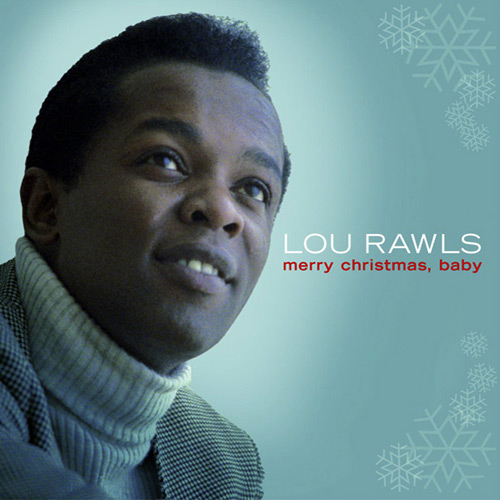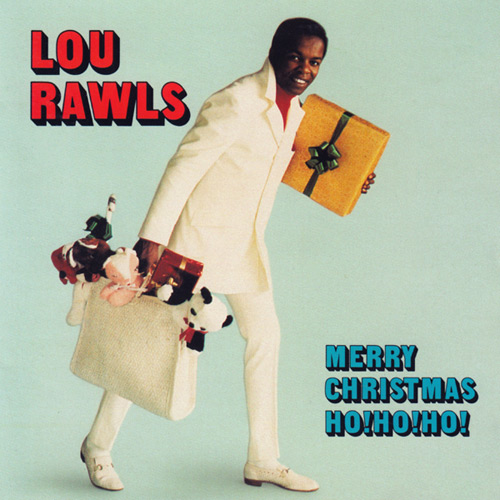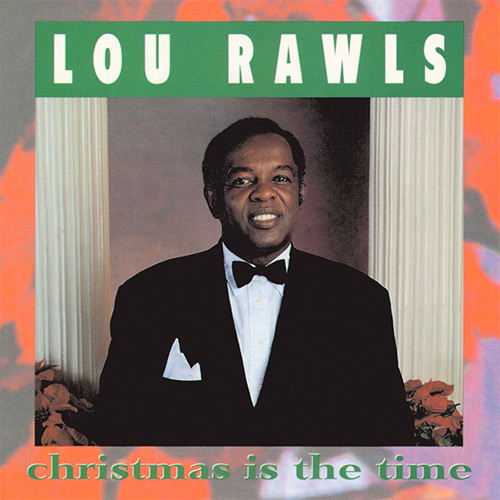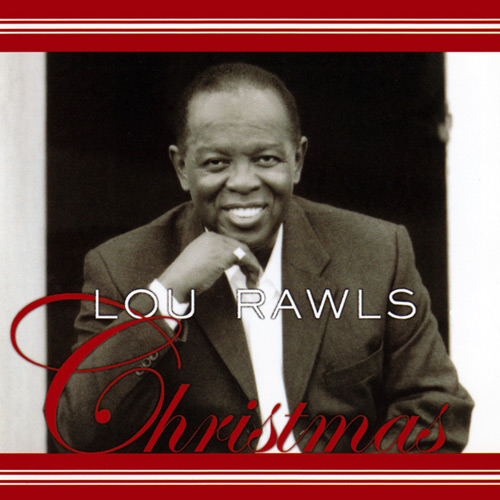
Lou Rawls
rhythm & blues
Support www.hipchristmas.com! ![]() Shop at Amazon, Apple Music, and more...
Shop at Amazon, Apple Music, and more...
 In
terms of pure vocal talent, I've always found Lou
Rawls to be the ultimate rhythm & blues singer.
Certainly, he lacks the
melismatic grace of his friend Sam Cooke, nor does he possess the
raw power of Otis Redding or Wilson Pickett, or the stealthy sensuality of
Al Green. But, boy, can he sing. With his deep voice, smooth as molasses
on a summer day, Lou Rawls can tickle soulful tones out of the most pedestrian
song. Given a good one - like "Tobacco
Road" (1963), "Love
Is A Hurtin' Thing" (1965), or "You'll Never Find Another
Love Like Mine" (1976) - Lou lifts his listeners straight to the
moon. It comes as no surprise, then, that Rawls' three Christmas albums are models of consumate craft and impeccable
taste. The first one, Merry
Christmas Ho! Ho! Ho! (Capitol, 1967), is exceptional, and the later albums - Christmas
Is The Time (Manhattan, 1993) and Lou
Rawls Christmas (Hylo, 2004) - both have fine moments.
In
terms of pure vocal talent, I've always found Lou
Rawls to be the ultimate rhythm & blues singer.
Certainly, he lacks the
melismatic grace of his friend Sam Cooke, nor does he possess the
raw power of Otis Redding or Wilson Pickett, or the stealthy sensuality of
Al Green. But, boy, can he sing. With his deep voice, smooth as molasses
on a summer day, Lou Rawls can tickle soulful tones out of the most pedestrian
song. Given a good one - like "Tobacco
Road" (1963), "Love
Is A Hurtin' Thing" (1965), or "You'll Never Find Another
Love Like Mine" (1976) - Lou lifts his listeners straight to the
moon. It comes as no surprise, then, that Rawls' three Christmas albums are models of consumate craft and impeccable
taste. The first one, Merry
Christmas Ho! Ho! Ho! (Capitol, 1967), is exceptional, and the later albums - Christmas
Is The Time (Manhattan, 1993) and Lou
Rawls Christmas (Hylo, 2004) - both have fine moments.
At the start of his career, Lou Rawls dabbled in blues and jazz - most notably on his collaboration with Les McCann, Stormy Monday (Blue Note, 1962). By 1967, though, Lou was easing his way into the pop mainstream. Thankfully, Rawls and producer David Axelrod chose the material on Merry Christmas Ho! Ho! Ho! wisely, emphasizing modern, secular compositions (like Charles Brown's "Merry Christmas Baby") rather than traditional or sacred warhorses. And, arranger H.B. Barnum kept Lou grounded in brassy rhythm & blues - closer to the Memphis soul of Bobby 'Blue' Bland than the Las Vegas swing of Frank Sinatra.
 With
Rawls' vocals striking just the right balance of swagger and sweetness, Merry
Christmas Ho! Ho! Ho! qualifies as a minor Christmas classic - a little too smooth
in places, but a classic all the same. Most impressively, Ho!
Ho! Ho! includes what I believe is the all-time definitive take on "Have
Yourself A Merry Little Christmas," a song first recorded by Judy Garland in
1944 and covered by thousands of singers since. But, Lou gives every track his best
effort, so even old warhorses like "Santa Claus Is Coming To Town"
swing like crazy. Another track, "Little Drummer Boy," was released as a single and, buoyed by Barnum's sly, funky, unconventional arrangement, it reached #2 on Billboard's Christmas chart.
With
Rawls' vocals striking just the right balance of swagger and sweetness, Merry
Christmas Ho! Ho! Ho! qualifies as a minor Christmas classic - a little too smooth
in places, but a classic all the same. Most impressively, Ho!
Ho! Ho! includes what I believe is the all-time definitive take on "Have
Yourself A Merry Little Christmas," a song first recorded by Judy Garland in
1944 and covered by thousands of singers since. But, Lou gives every track his best
effort, so even old warhorses like "Santa Claus Is Coming To Town"
swing like crazy. Another track, "Little Drummer Boy," was released as a single and, buoyed by Barnum's sly, funky, unconventional arrangement, it reached #2 on Billboard's Christmas chart.
It's worth noting that Merry Christmas Ho! Ho! Ho! also includes several songs written specifically for the project by J.W. Alexander, a former member of the gospel group Pilgrim Travelers and the man who discovered Sam Cooke. In 1951, Rawls had replaced Cooke in another gospel group, the Highway Q.C.s, and Lou later sang with a latter-day version of the Pilgrim Travelers. At any rate, one of Alexander's songs, "Christmas Will Really Be Christmas," is a highlight of the record.
During the two decades following Merry Christmas Ho! Ho! Ho!, Lou Rawls became a show business mainstay. In the 1970's he joined Kenny Gamble and Leon Huff's now-legendary Philadelphia International label, selling more records than during any other period of his career. He became the voice of Budweiser beer (in their TV ads), the voice of Garfield the cat (in the cartoons), and the voice of the United Negro College Fund (in a long-running series of "Parade of Stars" telethons).
 So,
by the time Lou Rawls recorded Christmas
Is The Time, he was both an elder statesman and a much older man - neither
of whom had much to prove, or much reason to go out on a limb. Not surprisingly,
then, Christmas
Is The Time is a much more conservative effort stocked mainly with predictable
holiday standards. Lou's voice is remarkably well-preserved, but too often the
arrangements teeter on the precipice of easy listening or, even worse, smooth jazz.
Consequently, Christmas
Is The Time is a worthwhile purchase mainly for Rawls aficionados and
Christmas geeks (c'est moi).
So,
by the time Lou Rawls recorded Christmas
Is The Time, he was both an elder statesman and a much older man - neither
of whom had much to prove, or much reason to go out on a limb. Not surprisingly,
then, Christmas
Is The Time is a much more conservative effort stocked mainly with predictable
holiday standards. Lou's voice is remarkably well-preserved, but too often the
arrangements teeter on the precipice of easy listening or, even worse, smooth jazz.
Consequently, Christmas
Is The Time is a worthwhile purchase mainly for Rawls aficionados and
Christmas geeks (c'est moi).
At its best, though, Christmas Is The Time affords Rawls another chance to do what he does best - to sing, swing, or both. Lou actually helped write the title track - the only original song on the album - and it's lovely statement of purpose, helped along by some tasty guitar. A few of the traditional numbers - such as "God Rest Ye Merry Gentlemen" and "The First Noel" - profit from hip arrangements, but even Lou Rawls can't wring much soul out of songs like "We Wish You A Merry Christmas."
The modern pieces - like "I'll Be Home For Christmas" - generally fare better. But, Lou had already assayed two of them ("The Christmas Song" and "Have Yourself A Merry Little Christmas") on Ho! Ho! Ho! - so they don't count. Throughout the album, Christmas Is The Time is weighed down by synthesizers and some surprisingly anemic background singers, so it's almost a relief when Lou finally closes the album with "Auld Lang Syne" - singing a cappella.
More to my liking is "So They Say It's Christmas," a song written by Brian Setzer for Lou Rawls to sing in the 1996 Arnold Schwarzenegger vehicle Jingle All The Way. The song tells a well-worn tale of seasonal loneliness, but with support from Setzer's big band, Lou puts the song on slow burn, paying tribute to the holiday that is making him miserable. Setzer included his own version on his 2002 album, Boogie Woogie Christmas, but Rawls' original vocal remains available only on the Jingle All The Way soundtrack album.
 Shortly
before his death from cancer, Lou recorded one last holiday record, the jazzy Lou
Rawls Christmas (Hylo, 2004), a low-budget affair initially sold exclusively at Barnes
& Noble stores. Arguably, the album is nearly superfluous, as all but four of the
titles appear on Lou's previous holiday efforts. Moreover, his voice is ragged
- though from age or disease, it's hard to say. Even when placed far forward in
the mix, Lou struggles to compete with pianist Adam Watkins' stiff and cluttered
arrangements. The best moments come when Watkins relaxes, reducing Rawls' band to
little more than piano and rhythm section. Particularly
on the sly and mischievious "Jingle Bells," this technique allows Lou's
mellow, natural cool to shine through.
Shortly
before his death from cancer, Lou recorded one last holiday record, the jazzy Lou
Rawls Christmas (Hylo, 2004), a low-budget affair initially sold exclusively at Barnes
& Noble stores. Arguably, the album is nearly superfluous, as all but four of the
titles appear on Lou's previous holiday efforts. Moreover, his voice is ragged
- though from age or disease, it's hard to say. Even when placed far forward in
the mix, Lou struggles to compete with pianist Adam Watkins' stiff and cluttered
arrangements. The best moments come when Watkins relaxes, reducing Rawls' band to
little more than piano and rhythm section. Particularly
on the sly and mischievious "Jingle Bells," this technique allows Lou's
mellow, natural cool to shine through.
In many ways, Lou Rawls Christmas is superior to Christmas Is The Time, though it pales next to Ho! Ho! Ho! Certainly, it's more fun. After all, Lou Rawls was a man with just months left to live, and he chose to spend some of it recording a Christmas album - you gotta love that. (In 2006, Time-Life reissued Lou Rawls Christmas with a new cover and one bonus track.)
Rawls recorded for several labels during his 50-year career, but most of them - including Capitol and Manhattan - are now owned by the same company, EMI. That makes possible sterling compilations like Anthology (2000), and it also means that a number of packages have been released that cherry-pick from both Merry Christmas Ho! Ho! Ho! and Christmas Is The Time. The first such album, Christmas Will Be Christmas (2001), is smartly chosen but brief - just 12 tracks. More recently, Merry Christmas Baby (2006) upped the ante to 20 tracks, including Ho! Ho! Ho! in its entirety, more than half of Christmas Is The Time, and even a couple of songs from Lou Rawls Christmas. Altogether, Merry Christmas Baby is almost perfect - the obvious choice for all but the most devoted fans.
Consumer Notes. Numerous other Lou Rawls Christmas CD's have been released. Most recycle portions of Merry Christmas Ho! Ho! Ho! - nothing wrong with that - but they are chintzy, budget-oriented rip-offs compared to Merry Christmas Baby. That collection may cost you a few more bucks, but it's a far better value. [top of page]
 Albums
Albums
- Merry Christmas Ho! Ho! Ho! (1967)
- Christmas Is The Time (1993)
- Lou Rawls Christmas (2004)
- Christmas Will Be Christmas (1967-1993; 2001)
- Merry Christmas Baby (1967-2004; 2006)
 Essential Songs
Essential Songs
- Christmas Is (1967)
- Christmas Is The Time (1993)
- Christmas Will Really Be Christmas (1967)
- The First Noel (1993)
- God Rest Ye Merry Gentlemen (1993)
- Have Yourself A Merry Little Christmas (1967)
- I'll Be Home for Christmas (1993)
- Jingle Bells (2004)
- Little Drummer Boy (1967)
- Merry Christmas Baby (1967)
- So They Say It's Christmas (with Brian Setzer) (from Jingle All The Way, 1996)
- What Are You Doing New Year's Eve? (1967)
 Further Listening
Further Listening
- The Christmas Song (Nat King Cole, 1961)
- Happy Holidays To You (Whispers, 1979)
- Hipsters' Holiday: Vocal Jazz And R&B Classics (various artists, 1989)
- The Spirit Of Christmas (Ray Charles, 1985)